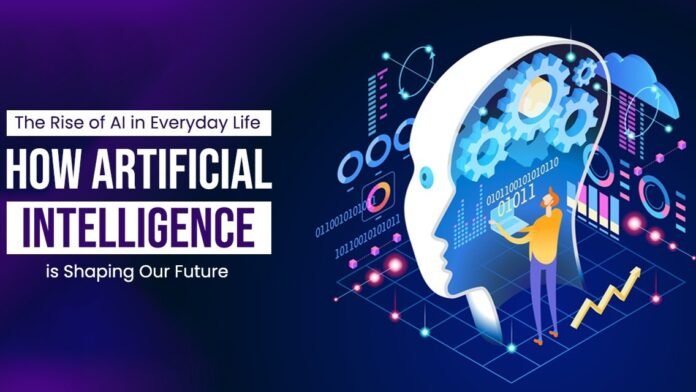Introduction
Artificial Intelligence (AI) is no longer a futuristic concept; it is part of our everyday lives. From using voice assistants like Siri and Alexa to personalized recommendations on Netflix and Amazon, AI is shaping the way we live, work, and interact with technology. Businesses are harnessing AI to improve decision-making, while industries like healthcare, education, and finance are transforming with AI-driven tools.
This article explores how AI is influencing daily life, the benefits it brings, and the challenges society faces in adopting this technology responsibly. By understanding how AI works and where it is applied, readers can make informed decisions, build trust in technology, and prepare for the future of work. Let’s dive into the many ways artificial intelligence is reshaping the modern world and why it’s essential to embrace its potential while staying mindful of ethics and human values.
What is Artificial Intelligence?
Artificial Intelligence refers to the simulation of human intelligence by machines that are programmed to think, learn, and solve problems. Unlike traditional software, AI can analyze patterns, process large datasets, and make predictions without being explicitly programmed for every situation.
Key AI types include:
- Machine Learning (ML): Algorithms that learn from data.
- Natural Language Processing (NLP): Understanding and generating human language.
- Computer Vision: Analyzing visual data like images and videos.
- Robotics: Machines performing physical tasks intelligently.
How AI Impacts Daily Life
1. AI in Communication
Voice assistants (Siri, Alexa, Google Assistant) simplify tasks like setting reminders or finding information. Chatbots on websites offer 24/7 customer support, making businesses more efficient.
2. AI in Healthcare
- Medical imaging powered by AI detects diseases earlier.
- Virtual health assistants provide instant medical advice.
- Predictive analytics help in personalized treatment plans.
3. AI in Education
- Personalized learning platforms adapt to student progress.
- AI-powered grading saves teachers time.
- Virtual tutors enhance accessibility for remote learners.
4. AI in Transportation
- Self-driving cars use AI for navigation and safety.
- Ride-sharing apps like Uber optimize routes with AI.
- Smart traffic management reduces congestion in cities.
5. AI in Entertainment & Shopping
- Netflix, Spotify, and Amazon recommend products or shows.
- Gaming industries use AI for realistic interactions.
- E-commerce platforms enhance customer experiences with personalization.
Benefits of AI in Society
- Efficiency & Productivity: Automation speeds up tasks.
- Accuracy: AI reduces human error in sensitive fields like healthcare.
- Convenience: From smart homes to personalized apps.
- Innovation: AI drives creativity in tech and business.
Challenges & Concerns of AI
- Job Displacement: Automation may replace some human roles.
- Bias & Fairness: AI models reflect the biases of training data.
- Privacy Issues: Data collection raises security concerns.
- Ethics: Ensuring AI aligns with human values is crucial.
The Future of AI in Daily Life
In the coming years, AI will become more integrated into everyday tools. Smart cities, AI-powered healthcare, personalized education, and autonomous vehicles will become mainstream. Governments and organizations must collaborate to ensure ethical use, transparency, and accessibility for all.
Read More: Who Is Anna Ezratti? The Private Partner Behind Itzhak Ezratti & GL Homes
Conclusion
Artificial Intelligence is transforming every corner of modern life, from healthcare and education to shopping and entertainment. Its ability to analyze data, automate tasks, and personalize experiences makes it a powerful tool for businesses and individuals alike. However, with great potential comes great responsibility—AI must be developed with ethics, fairness, and transparency in mind to ensure that technology benefits everyone.
While AI cannot replace human creativity, empathy, and values, it can complement human capabilities to create a more efficient, innovative, and connected world. By embracing AI responsibly, society can unlock new opportunities while minimizing risks. The future belongs to those who learn to collaborate with AI, using it as a partner in progress rather than a competitor. Artificial Intelligence is not just about machines—it’s about enhancing human potential and shaping a smarter tomorrow.
FAQs
Q1. How is artificial intelligence used in everyday life?
AI is used in voice assistants, recommendation systems, online shopping, healthcare apps, self-driving cars, and smart home devices.
Q2. What are the benefits of artificial intelligence?
AI improves efficiency, reduces errors, offers personalization, and enables innovation across industries.
Q3. Will AI take over human jobs?
AI may replace repetitive tasks but also creates new opportunities in AI development, data analysis, and tech innovation.
Q4. Is AI safe to use?
AI is safe when developed with transparency and ethical practices, though privacy and data security must be carefully managed.
Q5. What is the future of AI?
The future includes AI-powered healthcare, smart cities, autonomous vehicles, and personalized education, shaping a more advanced society.
